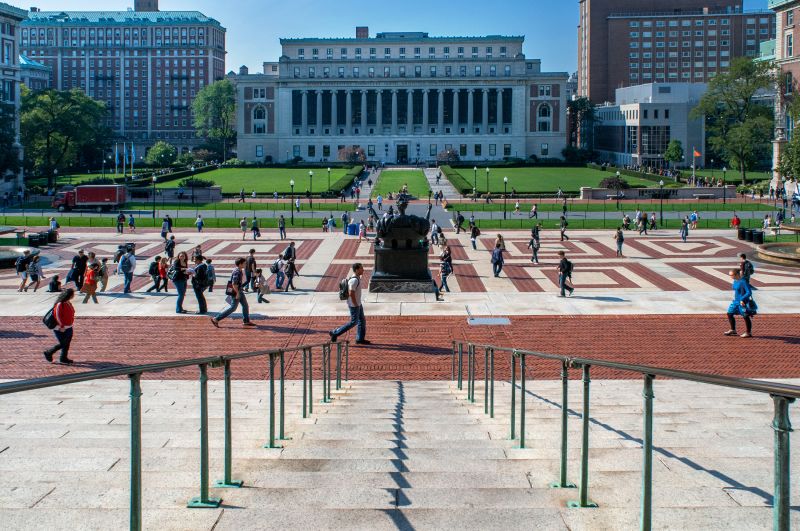
Columbia University said that it relied on “outdated and/or incorrect methodologies” in submitting data to U.S. News & World Report for consideration in the publication’s 2021 college rankings, according to a statement released by the university Friday.
“The Columbia undergraduate experience is and always has been centered around small classes taught by highly accomplished faculty. That fact is unchanged. But anything less than complete accuracy in the data that we report – regardless of the size or the reason – is inconsistent with the standards of excellence to which Columbia holds itself,” the statement reads. “We deeply regret the deficiencies in our prior reporting and are committed to doing better.”
In February, Columbia Mathematics Professor Michael Thaddeus questioned the Ivy League school’s rise in rankings from 18th place, on its debut in 1988, to 2nd place in 2021. In a statement posted on Columbia University’s Department of Mathematics’ website, Thaddeus noted that “few other top-tier universities have also improved their standings, but none has matched Columbia’s extraordinary rise.”
Thaddeus pointed to data submitted by the university to U.S. News & World Report in questioning Columbia’s seemingly meteoric rise in rankings.
“Can we be sure that the data accurately reflect the reality of life within the university?” Thaddeus rhetorically asked. “Regrettably, the answer is no.”
The math professor then tabulated data on “undergraduate class size, percentage of faculty with terminal degrees, percentage of faculty who are full-time, and student-faculty ratio” submitted by Columbia University to U.S. News & World Report and compares the data “with figures computed by other means, drawing on information made public by Columbia elsewhere.”
In his findings, Thaddeus said there were “discrepancies sometimes quite large” which seemed to always work in Columbia’s favor.
In response to Thaddeus’ findings, Columbia University Provost Mary Boyce said in a June statement that the university would “refrain from submitting data to U.S. News and World Report” for consideration in the publication’s 2022 undergraduate college rankings.
“On two of the metrics questioned by our faculty member [Thaddeus], class size and faculty with terminal degrees, we determined we had previously relied on outdated and/or incorrect methodologies. We have changed those methodologies for current and future data submissions, as reflected in the newly posted Common Data Sets,” Boyce noted in June.
Boyce said starting Fall 2022, the university would start participating in the Common Data Set (CDS) Initiative, “a collaborative effort among data providers in the higher education community and publishers” to provide accurate information to students seeking information on institutions of higher education, according to the initiative’s website.
The CDS Initiative, represented by U.S. News & World Report, the College Board and educational services company Peterson’s, was launched in 1997 to provide institutions of higher education with “a set of standards and definitions of data items rather than a survey instrument or set of data represented in a database.”
U.S. News Chief Data Strategist Robert Morse told CNN Monday that schools report most of the information for their Best Colleges rankings directly to U.S. News.
“Each year, U.S. News sends an extensive questionnaire to all accredited four-year colleges and universities,” he explained. “U.S. News, a founding member of the Common Data Set initiative, incorporates questions from the CDS and proprietary questions on this survey. U.S. News relies on schools to accurately report their data.”
Coupled with the commitment of participating in the CDS Initiative, Boyce also announced the launch of a new webpage providing detailed context and analysis of the Columbia University undergraduate experience.
In July, U.S. News & World Report unranked Columbia University “from a number of rankings in the 2022 edition of Best Colleges (first published September 2021)” saying that the university “failed to respond to multiple U.S. News requests that the university substantiate certain data it previously submitted,” according to a blog post by U.S. News. It is unclear whether Thaddeus’ publication of his investigation into the data that Columbia presented to U.S. News & World Report may have contributed to the university being unranked.
In Friday’s statement, Boyce said the university posted two Common Data Sets, one for the Columbia College and Columbia Engineering, and one for Columbia General Studies.
“The information included in the two Common Data Sets reflects the University’s work in recent months to review our data collection processes, following questions raised by a faculty member regarding the accuracy of certain data the University submitted to U.S. News and World Report in 2021 for its ranking of undergraduate universities,” Boyce said.
“U.S. News publishes annual rankings for more than 11,500 schools and hundreds of individual programs as part of the Best Colleges, Best Graduate Schools, Best Online Programs, Best Global Universities and Best High Schools rankings,” Morse said in a statement Monday.
“To produce the rankings, U.S. News collects tens of thousands of data points from the schools themselves and other sources, including the U.S. Department of Education, state and local governments and higher education associations. A very small proportion of the total number of schools that are ranked – typically less than 0.1% each year – inform U.S. News that they have misreported data that were used to calculate their school’s ranking.”
U.S. News & World Report released a breakdown of how their publication calculated the 2022-2023 Best Colleges Rankings in an article Monday.
from U.S. - Latest - Google News https://ift.tt/HzRL0pS
via IFTTT
Tidak ada komentar:
Posting Komentar